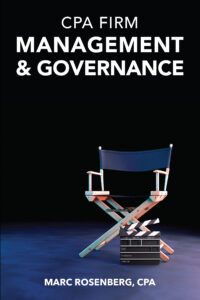Eternally Polarizing Management Practices
Twenty years of consulting gives me a unique view of CPA firm management. While many things have changed over the years – mostly for the better – others have remained the same. I always chuckle when I see firms take opposing views on issues that have been hotly debated for decades, with no sign of a truce. Where do your partners stand on these issues?
What partners are compensated for. Some feel that book of business/origination and billable hours should be the primary drivers of partner comp, because “that’s how we make money.” Yet, if you ask partners to name the most important factor in their firm’s success, many will say developing great staff. A glance at their partner comp systems reveals little or no credit for staff mentoring or any other intangible performance attributes. So who’s right? The production-only people or those advocating a blend of production plus intangibles?
Uniform work practices. One of any staff person’s biggest job frustrations is when partners have their own way of performing the same work function, requiring staff to painstakingly learn each partner’s preferences and risk getting reprimanded for working as taught by other partners. Yet, some partners feel it is their unalienable right to do whatever they want, when they want and in their own way.
The work partners do. Two adages are broadly accepted in our profession: (1) it’s more important what partners do with their non-billable than billable time and (2) partners should delegate work to the lowest level capable of doing the work. Yet, these axioms are repeatedly violated at firms with partners who ring up high levels of billable hours – at least half of which can be done by staff – and when they perform administrative work that should be the domain of support staff. Is it OK for partners to regularly do staff level work?
Developing your stars. Firms have three types of staff: (1) stars, (2) marginal people and (3) everyone in between. A basic, time-tested leadership development tactic is to identify your stars, communicate their high potential to them and provide them with opportunities to accelerate their ascent. But many firms fear that treating stars differently from other staff will alienate the latter, putting the firm at risk of losing them. These firms are willing to risk losing their stars in order to appease average and marginal staff. Which strategy is correct?
>> CPA Firm Management & Governance guides partners who want to run their firms like a real business. The book addresses ►Best Practices for managing and structuring the leadership group, ►how decisions get made, ►voting, ►how the Board functions, ►the role and expectation of a partner, ►the Managing Partner, ►organization structures for various firm sizes, ►job descriptions of key management positions, ►partner accountability and other issues.<<
Should the executive and compensation committees be two separate bodies or the same? Firms favoring separation cite the “separation of power” doctrine. Their partners fear these committees will abuse their power. Firms arguing for these two committees to be the same assert that separation weakens both. The combination advocates feel that the EC is a year-round body that develops strong, ongoing knowledge of each partner’s performance and is therefore, in an ideal position to allocate income fairly. To deprive the firm of the EC’s knowledge and experience weakens the EC and the CC. The EC and the CC: Are they better separate or combined?
Do mergers work? Yes, but only if you do them correctly. And there’s the rub – many firms do them improperly.
There is a myth that mergers don’t work. Like most myths, it’s based on misinformation and gossip. People talking to people talking to people, with no one in command of the facts. Yes, mergers do NOT work (1) if the parties fail to ask the correct and tough questions, (2) if due diligence is minimized and (3) the parties fail to assess their culture and personality fit.
Another reason the myth persists is that firms are judging the merger’s success by the wrong measures. I once met with a partner group to assess a very attractive merger offer that they voted unanimously to accept. After the vote, one partner asked: “So why aren’t we jumping for joy?” They loved their independence, their family atmosphere, the pride of being a second generation firm with little accountability. But that’s not how to measure a merger’s success. Instead, firms should ask whether they got the terms they sought, including their buyouts? Did they join a reputable, top notch firm? Will they gain advantages working at the new firm? Will their incomes likely increase due to the merger? These are the criteria for judging the success of a merger.

CPA Firm Management & Governance
Best practices for managing and structuring the leadership group; descriptions of both partnership and corporate styles; role of the managing partner and firm administrator; decision making; voting; the role of a partner and how the organization changes as the firm grows.
Learn More